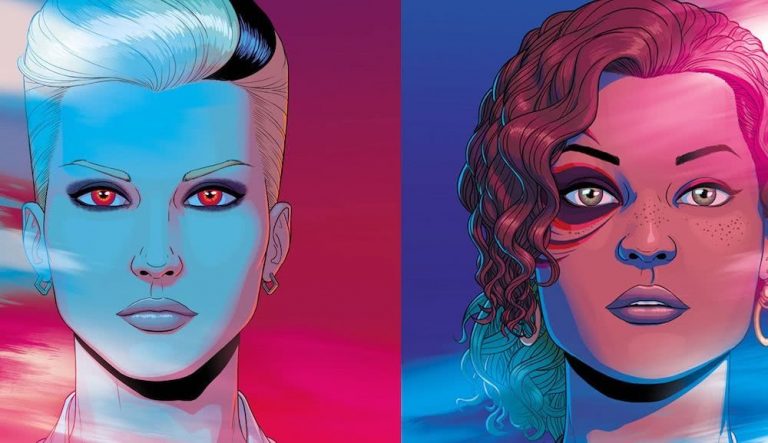We treat musicians like gods, so what if they were actually gods? What if Kanye West’s brags were literal, and he actually is a Canaanite storm god who could strike you down with a bolt of lightning at any given moment? That’s more or less the premise for The Wicked + The Divine.
Written by Kieron Gillen and drawn by Jamie McKelvie, this comic-book series focuses on an event known as the Recurrence: every 90 years, 12 gods reincarnate as humans. Known as The Pantheon, these 12 gods (based on deities from different religions and mythologies) take on the form of the most popular art form at the time. In this cycle, they’re pop stars: “They are loved. They are hated. In two years, they are dead.”
Their purpose? As put by the goddess Amaterasu, “We live to inspire. We make life worth living, for an evening at a time.”
The series follows Laura, a superfan that manages to enter the Pantheon’s inner circle by befriending Lucifer (there’s a sentence), allowing her to rub elbows with the pop deities. Think Almost Famous, but in a world where Billy Crudup calling himself “A golden god!” is fact, not exaggeration.
For all the time you spend obsessing over the minutia of your favourite band, it’s a predominately one-sided relationship.
Wic + Div’s main concept is the idea of pop culture fandom as religion, with fans worshipping at the feet of their favourite musicians as though they’re actual gods. The club is their church; the live performance their sermon. The god’s two-year lifespan is not unlike the pop music cycle, where the hottest act sits comfortably atop their cultural throne, until the next new thing comes along and replaces them. It’s all a very obvious metaphor, but Gillen is a clever writer and manages to use it to its full potential.
If there’s one thing Gillen “gets”, it’s fandom. He gets why you’d spend an exorbitant amount of money on that rare vinyl pressing of your favourite band, or why you’d line up at a venue six hours before the doors open to guarantee a spot. He also gets that there’s something inherently unhealthy about fandom. For all the time you spend obsessing over the minutia of your favourite band, it’s a predominately one-sided relationship. “Mortals have always shown more interest in gods than gods ever have in mortals,” explains the Pantheon’s advisor-cum-publicist Ananke. “Generally speaking, gods desire nothing but adoration.”
Love Music?
Get your daily dose of metal, rock, indie, pop, and everything else in between.
How do you deal with the revelation that the figure you love is problematic?
The gods wield a power that normal people can only dream of, allowing them to exist outside the restrictions of regular society – just like celebrities. The series’ opening arc is focused around whether the goddess Lucifer is actually responsible for publicly killing an innocent man, raising two major questions: How do you deal with someone for who the rules of normal society don’t apply, and in the case of Laura (and many other fans), how do you deal with the revelation that the figure you love is problematic?
The series also does a good job of reminding us that there’s a human heart beating under the mass-produced image of pop stars. The closer Laura gets to them, the more the shroud of celebrity fades away. From afar they might appear as these beautiful, perfect deities, but the closer Laura gets to them the more clearer their faults and vulnerabilities are. These gods have feet of clay. If fandom is the act of wanting to be special like your idol, what happens when you achieve that specialness? If you have everything, what else is there?
Wic + Div gives us the view from the bottom of Mount Olympus, as well as the view from the top. When you’re given a definite date of death, what do you do with those two years? Is “Live fast, die young” a way to live, or is it better to fade away? Are the lows worth the highs?
Dionysus, the god of bacchanal pleasure by way of an ecstasy-dropping raver, constantly hears other people’s voices in his head and hasn’t slept since his reincarnation. In one of the more confronting moments of the series, a god takes their own life, unable to shoulder the rampant abuse directed towards them and unable to live up to the audience’s expectations. Being famous doesn’t make life easier. If anything, it paints a bigger target on your back by becoming the centre of popular culture. Nothing is without a price.
It’s not all doom and gloom; Gillen is one of the best comic writers out. He knows his mythology, as well as he knows his music (and god, does he know his music). It’s fun trying to pick out which pop stars influenced the gods. Some are easier than others; Inanna, an ancient Sumerian deity of desire and sex, is heavily inspired by Prince (purple rain included).
McKelvie is the Richards to Gillen’s Jagger. His art is gorgeous and expressive, with character designs that are the epitome of cool. He also knows how to draw the hell out of an action scene. There’s a moment where the Pantheon throwdown against one another, in what can only be described as, “What if Joseph Kahn directed The Avengers?”
Heading into the final third of the series, with thirty plus issues under its belt so far, Wic + Div has the makings of being a modern classic. It has the deft storytelling and strong characters that let it easily stand toe-to-toe with other non-superhero favourites like The Sandman, Y The Last Man or Preacher. If you worship at the altar of pop culture or have ever loved an artist so much that it hurts, The Wicked + The Divine gets you.
The sixth collected volume of The Wicked + The Divine is out now through Image Comics.

































